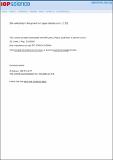Files in this item
Site selectivity in the growth of copper islands on Au (111)
Item metadata
| dc.contributor.author | Grillo, Federico | |
| dc.contributor.author | Fruchtl, Herbert Anton | |
| dc.contributor.author | Francis, Stephen Malcolm | |
| dc.contributor.author | Richardson, Neville V | |
| dc.date.accessioned | 2014-01-17T16:31:01Z | |
| dc.date.available | 2014-01-17T16:31:01Z | |
| dc.date.issued | 2011 | |
| dc.identifier | 26587437 | |
| dc.identifier | bc2f2c76-d159-4baf-91ab-643245f651bc | |
| dc.identifier | 79251549803 | |
| dc.identifier | 000288903600044 | |
| dc.identifier.citation | Grillo , F , Fruchtl , H A , Francis , S M & Richardson , N V 2011 , ' Site selectivity in the growth of copper islands on Au (111) ' , New Journal of Physics , vol. 13 , 013044 . https://doi.org/10.1088/1367-2630/13/1/013044 | en |
| dc.identifier.issn | 1367-2630 | |
| dc.identifier.other | ORCID: /0000-0001-9961-1212/work/29708448 | |
| dc.identifier.other | ORCID: /0000-0001-6647-4266/work/60887488 | |
| dc.identifier.uri | https://hdl.handle.net/10023/4395 | |
| dc.description | This work is supported by the European Union in the scope of the SURMOF project under which this work was undertaken (contract number STRP 032109) | en |
| dc.description.abstract | The room temperature deposition of copper onto a Au(111)-(22×√3) reconstructed surface has been investigated using scanning tunnelling microscopy (STM), up to a copper coverage of approximately 0.7 monolayer (ML). At extremely low coverage (~0.02 ML), preferential adsorption is observed to occur by displacement of gold atoms and incorporation of copper into the top gold layer at alternate herringbone elbows along the langle112rangle directions. Both fcc regions and hcp regions are occupied. With increasing coverage, incorporation of copper continues but copper is also deposited on top of the incorporated copper islands. When full coverage of these islands to monolayer thickness is reached, further deposition leads to preferential growth of those islands located in hcp regions through both the deposition process and migration of copper from other elbows, predominantly those in fcc regions. Eventually, a critical island size is reached above which atomically thick copper islands exhibit a reconstructed surface similar, in essence, to that of the clean gold surface. Models for the initial adsorption mechanism, island formation and the eventual reconstruction of the copper islands are discussed qualitatively in terms of surface strain within the gold and copper surfaces. | |
| dc.format.extent | 19 | |
| dc.format.extent | 3742310 | |
| dc.language.iso | eng | |
| dc.relation.ispartof | New Journal of Physics | en |
| dc.subject | QC Physics | en |
| dc.subject | QD Chemistry | en |
| dc.subject.lcc | QC | en |
| dc.subject.lcc | QD | en |
| dc.title | Site selectivity in the growth of copper islands on Au (111) | en |
| dc.type | Journal article | en |
| dc.contributor.institution | University of St Andrews. School of Chemistry | en |
| dc.contributor.institution | University of St Andrews. Office of the Principal | en |
| dc.contributor.institution | University of St Andrews. EaSTCHEM | en |
| dc.identifier.doi | 10.1088/1367-2630/13/1/013044 | |
| dc.description.status | Peer reviewed | en |
This item appears in the following Collection(s)
Items in the St Andrews Research Repository are protected by copyright, with all rights reserved, unless otherwise indicated.

